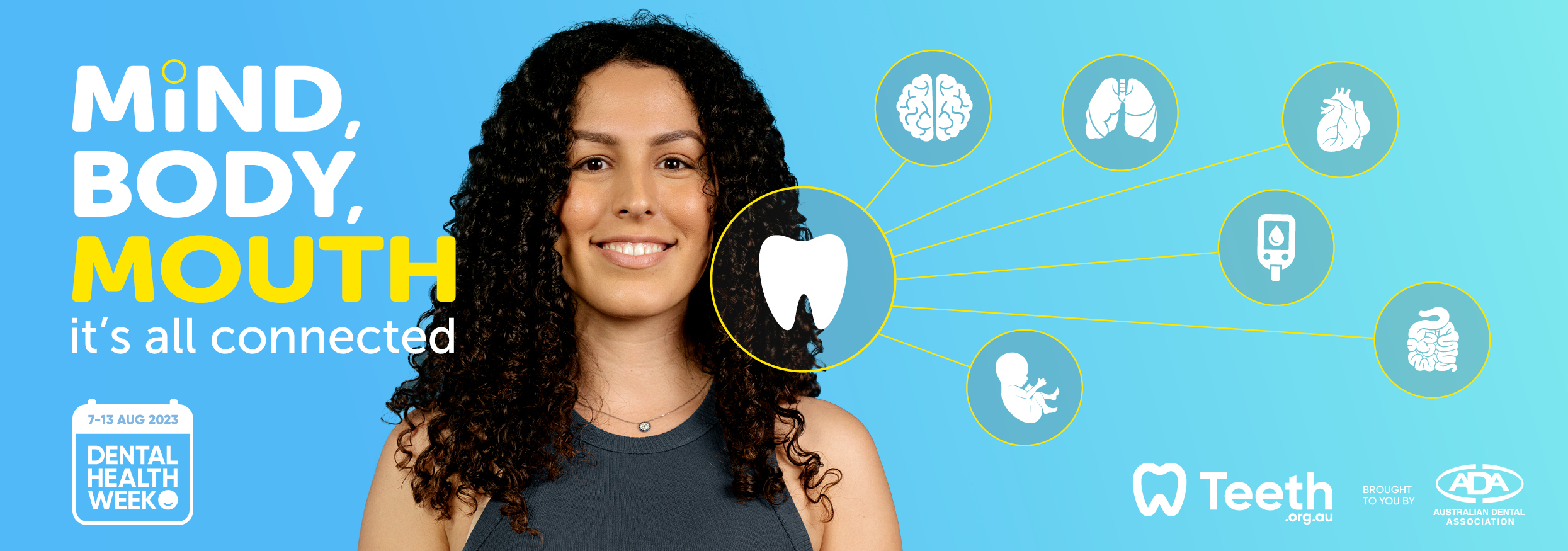 31 July 2023
31 July 2023
This year Dental Health week takes place from August 7-13, focusing on the mouth and whole-body connection.
The health of our mouth influences the rest of the body with a range of medical conditions affected by or affecting oral health. Bacteria in the mouth can travel to different sites of the body and inflammation in the mouth can increase the body’s overall inflammation. This Dental Health Week, six conditions have been explored in how they link with the mouth:
- Heart Disease- There is strong evidence linking severe gum disease and heart diseases due to bacteria traveling from the mouth to the heart and an overall increase in inflammation.
- Diabetes- There is a two-way relationship between gum disease and diabetes. Diabetes can increase an individual’s risk of developing severe gum disease, just as gum disease may negatively affect blood sugar levels.
- Alzheimer’s Disease- There are early links suggesting that severe gum disease (Periodontitis) may contribute to Alzheimer’s disease and cognitive decline due to bacteria traveling from the mouth to the brain and an overall increase in inflammation.
- Adverse Pregnancy Outcomes- There is early evidence that associations between severe gum disease and adverse pregnancy outcomes have been thought to occur due to an overall increase in inflammation and bacteria traveling from the mouth to the placenta.
- Lung Conditions- There is early evidence supporting the association between periodontitis and some common lung conditions such as chronic obstructive pulmonary disease (COPD), obstructive sleep apnoea (OSA) and COVID-19 due to inhalation of oral bacteria into the lungs and total increase of inflammation.
- Inflammatory Bowel Disease – There is early evidence indicating a link between severe gum disease and inflammatory bowel diseases. Some studies have shown mouth bacteria in the gut.
If you’re concerned about your oral health’s connection to any of the above conditions, learn more from the Australian Dental Association (ADA) or book an appointment with your dentist to determine if your oral health could be affecting the rest of your body.
What you can do for your oral health
Prioritising good oral hygiene helps to improve not only the health of the mouth but reduces the effects that disease’s within the mouth may have on other chronic conditions. Luckily there are just 4 simple steps that you can take to care for your mind body and mouth.
- Brush your teeth twice a day using fluoride toothpaste. Don’t forget to replace your toothbrush every 3 months, or after you’ve been unwell.
- Clean between your teeth every day using floss or interdental brushes.
- Eat a healthy balanced diet, limiting added sugar intake and drinking plenty of water. Don’t forget to check with your local council to see if your tap water is fluoridated as this will help to protect your teeth.
- Visit the dentist regularly for check-ups and preventative care. We recommend visiting your dentist every 6 months for a general check-up. Your dentist will check for tooth decay, gum disease and check for any signs of oral cancer.
If it’s been more than 6 months since you last saw a dentist for a check-up, book an appointment today and care for your body.





